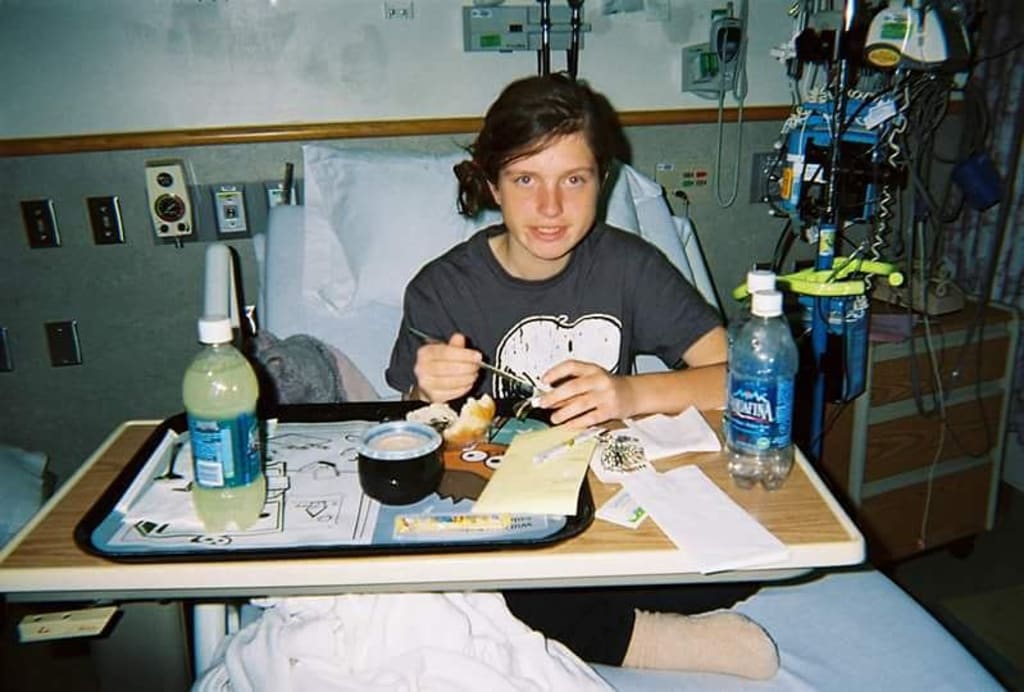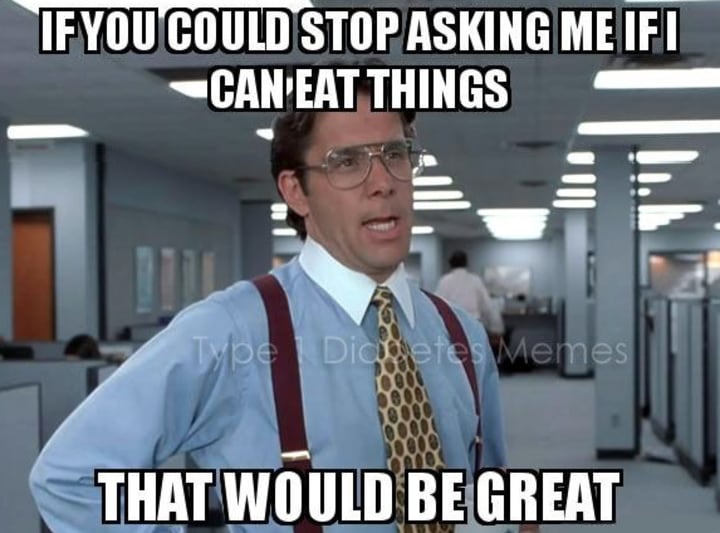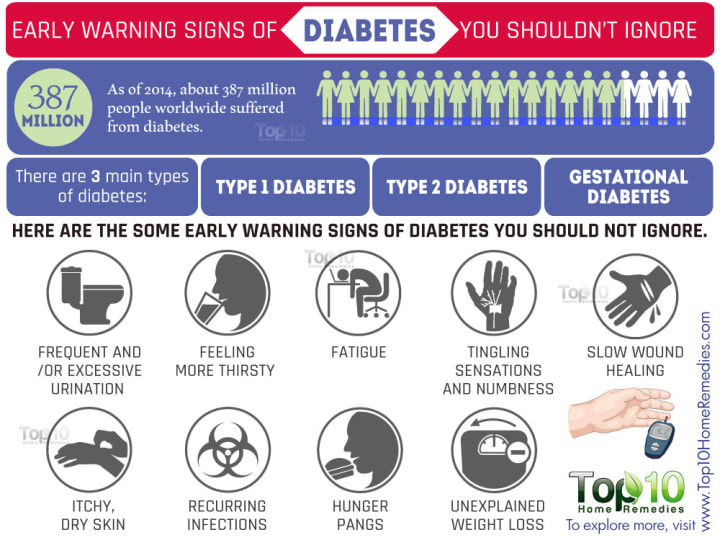Being Diagnosed with a Deadly Disease that the World Deems Your Fault
How I accepted having type one diabetes.

Waking up to pee, sometimes 10 to 12 times per restless night. Sneaking downstairs to the fridge to indulge myself with bottles upon bottles of water, a few juice boxes, and cans of soda. Not being able to see clearly, everything shortly becoming a fuzz at times despite my 20/20 vision. Sitting in 7th grade pre-algebra class suddenly very confused. Getting unreasonably sick after eating a slice or two of pizza. Having emotional outbursts with no cause. My jeans becoming a little looser, even though my hunger could never be satisfied. Inside, I knew something was wrong, terribly wrong but I couldn't let myself believe that. I was 13, surely these changes were just part of growing up.As with any other Monday morning, I waited for the school bus with my older sister, who was a senior in high school at the time. I complained to her that I wasn't feeling well and that I didn't think I had the energy to play my saxophone in first period band that morning. She told me just to take it easy and maybe go to the nurse if I didn't get better.
I wasted no time and checked into homeroom before 7:30 and immediately high-tailed it to the nurse, who was quite surprised to be seeing anyone before the first bell rang. When asked what was the matter, I simply said, "I really don't feel good at all."
Of course, she asked for a bit more detail and I replied that I felt like I had to throw up. The first thing she asked was if it could possibly be my period. I was a bit annoyed because I'd been feeling crappy for a good two and a half months, and now here was a medical professional suggesting it was merely menstruation. Turns out that wasn't the culprit (shocker!) but sometimes on the worst days, I think I would have preferred that to be my problem.I lied on the cot until third period. I had not thrown up; I only made a few trips to the bathroom for urination. I was sent back to the longest 43 minute class of my life. I usually enjoyed this particular class, but that day I could not accomplish anything with the indescribable feeling in my stomach and a foggy headache looming over me.
I moseyed by way to my fourth period class, and started copying the weekly vocabulary to my notebook, unaware of how I must have looked. "I'm sending you to the nurse right now. You look like a ghost, you're so pale!" was more or less the words my gifted teacher let out at me. I was in no position to contest it; I felt like actual garbage. I was so glad that at least someone saw the pain I was in. Again, I lied on the cot. Suddenly I sat up with the need to vomit. Now. I stumbled to the bathroom, probably looking drunk (I totally would not have passed the straight line test).
I barely made it to the toilet before it all came out. I puked and puked until I got relief. As I was telling the nurse what happened, a girl already started to use the restroom that I unleashed my insides in before I could warn her that I just threw up all over the toilet seat (oops). The nurse called for me to go home and my grandparents stayed with me until my father returned home that afternoon.A type 2 diabetic himself, he saw the signs. He knew, but I would not let him near my fingers. Who would want to be pricked and tested like a lab rat? Not me. Even more, I didn't want to see the result on the meter. I didn't want to know that I might have diabetes. Soon we were at my doctor's office. The scale read a good 25 pounds less than my last visit. Where I normally was on the heavier end of average, now I was skin and bones. I sunk under my roomy hoodie that hid my weight loss and my jeans that slightly slid down without a belt.
Hey, I'm finally losing weight, I thought nervously.
Sitting on the exam table waiting, I eyed the posters about diabetic foot checks. Don't let it be me.The PA entered the room with a blood glucose meter. My dad had described his concerns on the phone, so they knew what to do. Grabbing my middle finger and pressing the lancing device harshly on my fragile body, the PA squirted my blood into the test strip. "It's over 100," she said, looking astonished. "I'm getting the doctor."Over 100, that's not too bad. My dad looked worried. "She said it's over 500," he muttered."No," I replied, "she said 100." I was already beginning to deny the truth, so much that I convinced myself she said something she did not.The doctor came in and told us the meter read high. On the office's meter, anything that is over 500 mg/dl would register as "HI" as it's not sophisticated enough to read above that.
I burst into tears as she said that she was calling the local hospital and we were to go to the emergency room right away. I was so afraid of hospitals. My ever-caring doctor at the time told me to "suck it up. You're going to have diabetes for the rest of your life!" Not the greatest bedside manner.
Fast forward to the ER. My blood sugar is over 1000 mg/dl. Yikes. To clarify, a nondiabetic's blood sugar should be under 100. I was over 10 times that amount. A nurse helped me walk to the bathroom.
I was weak, weaker than I've ever been. I remember a doctor saying, "she's severely dehydrated." I wanted so badly to eat something but I wasn't allowed. IV fluids pumped into me and I was hooked up to all sorts of machines. I didn't know it at the time, but I was in DKA, or diabetic ketoacidosis. According to the Mayo Clinic, DKA is "a serious complication of diabetes that occurs when your body produces high levels of blood acids called ketones."
It occurs when your body can't produce enough insulin. Insulin is how the body converts sugar into energy, so when there isn't any insulin to break it down, the body turns to fat. That's why I lost so much weight; my body couldn't use the sugar I got from food, so it instead broke down my fat, leaving me with a buildup of ketones.
DKA is fairly common at the onset of type 1 diabetes, but I am in danger of it any time my blood sugar is excessively high (anywhere from ~300mg/dl and above) or if I am sick and test positive for moderate or larger ketones.The most annoying thing about my stay in the emergency room was the bloodwork. From a young age, I hated bloodwork. But I'd only known what drawing blood from a vein felt like until that night when I was introduced to a new horror: the artery. It felt agonizing and I had to have blood drawn every 2 hours for tests. My dad and I were informed that we wouldn't be able to stay at the local hospital. There weren't any pediatric endocrinologists on the staff, so I would have to be transported to another facility.
We chose CHOP and what a great choice that was! I was super excited for the first time that day because the original plan was for me to be flown there by helicopter.
Sadly, though, all of their helicopters were in use and it would take too long once they cleaned and reloaded. An ambulance crew made the two hour drive north, and got lost along the way to me.
It was after midnight by the time they arrived. One of the ladies put on a horse movie for me to watch and I slept all the way through it until the very end.
In the cold December night, I was wheeled on the stretcher in only my hospital gown and a blanket or two into the hospital.
I received the best care at Children's Hospital. I was happy to learn that most, if not all, of the nurses that cared for me were type one diabetics, themselves. It helped me to not feel alone. Some of my family members met me at the hospital to learn how to manage T1D with me. Insulin, blood glucose, ketones, carb counting, insulin to carb ratios, high coverage, glucagon: all of this was entirely new to me. From this point on, for every time I eat, I would have to check my blood sugar, count the carbohydrates in whatever I'm about to eat, divide the carbs into units of insulin using my insulin to carb ratio, account for a high sugar with additional units of insulin or subtract units for a mild low, and inject myself with a shot of insulin. A new normal. You'd think based on the denial that I mentioned that I wouldn't have complied with any of this. But I did. I knew that it was that or death. My body doesn't produce insulin and I can't survive long without it.
I don't want to blow it out of proportion, but I can't sugarcoat it. If I waited much longer to see a doctor, I could have died. And each year, hundreds of kids die due to DKA or a misdiagnosis. (Here is a link to an awesome campaign from Beyond Type 1 that is dedicated to reversing the DKA problem we face!) It is because of this that I view my diagnosis not as a death sentence, but as a godsend. But being diagnosed wasn't the hardest part. More devastating than having your world flipped upside down was, and still is, the grand misconceptions about the disease. Type one diabetes is a chronic, autoimmune disorder. Chronic, meaning that it will last a lifetime, and autoimmune meaning that the body's immune system attacked the healthy cells to trigger the illness. However, that's not what many people think.A lot of people are under the impression that type one diabetes can be cured with a healthy diet and regular exercise. That's sadly not the case. In fact, there is no cure for diabetes; only treatment at this time. Another annoyance that diabetics face is the condescending notion from others that diabetes is somehow the fault of the diabetic or the diabetic's parents. No amount of sugar could have caused it. No late night trip to Burger King could have made me diabetic.
That cupcake I ate couldn't do the trick, either. Speaking of which, we HATE it when someone stares at us as we eat "junk food" or tries to warn us we "shouldn't be eating that." I can eat whatever I want, as long as I count the carbs and give myself the appropriate amount of insulin for it.

@everyone, listen to Lumbergh!
The worst thing I did was assume that everyone would just understand diabetes as quickly as I did. I'm not sure why I thought anyone would, since I was totally oblivious myself pre-diagnosis.
Someone in my family visited me at home after my week in the hospital and told me, "I knew somebody with diabetes. They cut his leg off!" THANKS! Just what I needed to hear.
At holidays, I found my relatives receiving gifts of chocolate and I started to get sugar free candy. I appreciate the thought, but actually, sugar free candy is worse for me.
While it may not contain sugar, these products substitute a sugar alcohol, which means two things: first, the candy contains the same amount of carbohydrates, so the substitution was virtually pointless for me, and secondly, laxatives...need I say more?There's also frustrating times when I went low in school. I made it a habit to inform all of my teachers of my condition, in case anything were to go wrong or I wasn't feeling well.
The first school I attended after diagnosis was probably more understanding but had a time-consuming policy for lows. I had to go to the nurse's office, check my sugar, drink orange juice, and wait 15 minutes until I could check again.
This isn't anything crazy, but I had to stay in the office until my sugar rose to a normal level. And my sugar comes up slowly. I can't tell you how many hours of class time I must have lost because of lows.
At my second school, I almost got detention for eating a Rice Krispie treat in attempts of treating my low. I had to shout from the back of class that it's because I have diabetes while my teacher reached for a detention slip. To my horror, a fellow student cracked a "diabeetus" joke but I later learned there were two other type one diabetics in my class.I've even gotten DMs from strangers on Instagram about how I can cure my diabetes with an all natural diet, by eating cinnamon, or my personal favorite: how I can cleanse my body and cure diabetes by surviving in the wilderness (um, what?). Unfortunately, none of that can be done. Through all the horror stories of amputations, crazy "cures", roller coaster highs, and those times a nighttime low left me unresponsive, I've somehow managed to come out on top. I am here. I am breathing. I am somewhat in control of my disease. I have accepted type 1 diabetes and even embraced it. It's not always easy, but I've learned to live with one of the most costly and widely misunderstood illnesses in modern times.
Below I've included a graphic depicting the warning signs of diabetes.
Warning signs of diabetes

If you are experiencing any of these symptoms or recognize them in a loved one, please consult a doctor. It could be life saving!
Diabetes is 24/7 and doesn't stop. So, neither will I.
About the Creator
Catherine Rose
fierce advocate of using your voice for good






Comments
There are no comments for this story
Be the first to respond and start the conversation.